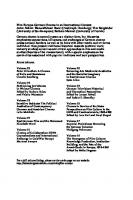A dream of resistance: the cinema of Kobayashi Masaki 9780813592374, 9780813592381, 9780813592350, 0813592372, 0813592380, 9780813592398, 0813592399
"Celebrated as one of Japan's greatest filmmakers, Kobayashi Masaki's scorching depictions of war and mil
285 123 10MB
English Pages [339] Year 2017;2018
Contents......Page 10
Introduction......Page 14
1. Conjoining Spirit and World......Page 25
2. A Sharp and Piercing Thorn......Page 83
3. The Logic of Negation......Page 136
4. Guardians of the Gate......Page 191
5. A Pilgrim on the Silk Road......Page 253
Acknowledgments......Page 310
Films by Kobayashi Masaki......Page 312
Notes......Page 314
Index......Page 328
Recommend Papers

- Author / Uploaded
- Kobayashi
- Masaki; Prince
- Stephen
File loading please wait...
Citation preview
Advance Praise for A Dream of Resistance Though director Kobayashi Masaki did not leave behind a large number of works, he conveyed through his films the stupidity, misery, and emptiness of war, which he experienced firsthand when he was forced to go to war. We see the origins of this in the diary, screenplays, and shishōsetsu that he kept on writing so as to leave behind proof of being alive during the days of his youth when death was a constant neighbor. He was regarded as a “filmmaker of steel.” But throughout his films—from his first family drama to his final film, The Empty Table (Shokutaku no nai ie)—you can see the figure of the director himself, drawn to beauty, friendly, easily moved to tears, prone to feeling lonely, straightforward, and possessing the heart of a youth. The reason that foreign audiences have praised and loved his work is surely that they identify with the love of humanity that they see in this figure. It has been one hundred years since Kobayashi Masaki’s birth and twenty since his death. I sincerely hope that through Professor Prince’s book, the thoughts that director Kobayashi entrusted to his films will cross national borders and reach a new generation. —Kajiyama Koko, Managing Director, Geiyukai, Kobayashi Masaki archive
All people possess dignity and should live in a manner befitting human beings. Through his films, director Kobayashi Masaki insists that this is how human existence ought to be. In The Human Condition, Harakiri, and Kaseki, this dignity is conveyed through the tragic dimensions of characters’ lives. In Tokyo saiban, it is communicated by holding all parties, including both accusers and accused, responsible for moving towards peace and a wish for the repose of countless souls. Kobayashi’s insistence on human dignity, situated in his sense of aesthetics and ethics, has struck a chord with many people not only in Japan but in each of the countries in which his works have been shown. 2016 marks one hundred years since director Kobayashi’s birth and twenty years since his death. In commemoration, Professor Prince delves broadly and deeply into the world of Kobayashi’s films, providing an introduction to the international community. This will be a great boon to a new generation of audiences. —Ogasawara Kiyoshi, coauthor of the screenplay for Tokyo saiban
A D r e am o f Resistanc e









